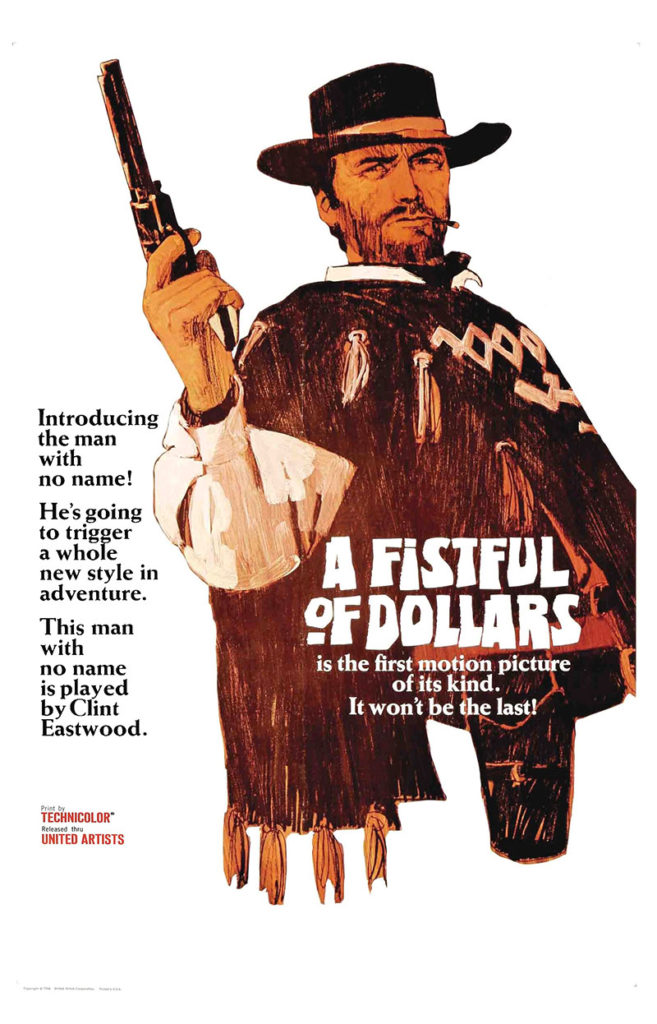I’ve been picking on Italian movies of late over in the Shitty Movie Sundays department. I can’t help it. I discovered Enzo G. Castellari recently and that opened the floodgates. Just about every week I find myself searching streaming services for another glorious train wreck from that most interesting of old world countries. It’s cinema devoid of shame, unapologetically opportunistic, and, to borrow a phrase from Tom Wolfe, gloriously low rent. Today’s film is not a cheap Italian knockoff designed to trick audiences into buying a ticket, though. Today’s film is a classic, even though its producers did find themselves on the wrong end of a plagiarism lawsuit.
A Fistful of Dollars, the 1964 spaghetti western from director Sergio Leone, is a remake of Akira Kurosawa’s classic Japanese period piece, Yojimbo. There’s no other way to describe it. The plot is the same, only small time Japanese crime lords in a feud over control of a village have been replaced by Mexicans and Americans feuding over a small town just south of the United States border; and a ronin has been replaced by a wandering gunslinger. The differences between Yojimbo and A Fistful of Dollars are aesthetic only, which is why the producers of the latter lost that aforementioned lawsuit. But never mind all that. This knockoff of a successful film is no cheap payday like The Last Shark. This film is a genre-defining work.
From the start a viewer can tell they’re in for something special. The opening title sequence, with music by Ennio Morricone, is a work of art. Bad movies never start off that well. After the bombastic music and canned gunshots fade, we see the protagonist, the man with no name (Clint Eastwood), wandering into town. Right away he can tell this is no normal town. The citizenry is in hiding. The only people on the streets are toughs working for either the Baxter or the Rojo families. These two have been warring over the town from compounds that are literally facing each other from opposite sides of the town center. The Baxters are Americans, their home constructed of wood painted a deep brown and looking as if it would be more at home in St. Louis rather than south of the border. Meanwhile the Rojos, natives of the town, live in a palatial hacienda of whitewashed adobe.
The man with no name sees the situation in the town, with the two sides primed for all-out war, and decides there is an opportunity to make some money. He offers his services to both families in turn, playing both sides off of each other. His goal seems to be to  incite violence between the families so he can pick over the remains. It’s not the nicest of plans on the part of a film’s protagonist, and does result in some innocent death here and there. The man with no name is no hero. He is an opportunist who kills for money, plain and simple, even if there is a moment of uncharacteristic compassion shown during the film. Of course, playing both sides in a deadly fight carries risks, and the gunslinger finds himself in trouble. All his machinations eventually lead to one of the most brutal scenes of slaughter I’ve ever seen a film, despite the fact there’s very little blood.
incite violence between the families so he can pick over the remains. It’s not the nicest of plans on the part of a film’s protagonist, and does result in some innocent death here and there. The man with no name is no hero. He is an opportunist who kills for money, plain and simple, even if there is a moment of uncharacteristic compassion shown during the film. Of course, playing both sides in a deadly fight carries risks, and the gunslinger finds himself in trouble. All his machinations eventually lead to one of the most brutal scenes of slaughter I’ve ever seen a film, despite the fact there’s very little blood.
The plot is but one aspect of this film. Another is the way in which it was shot, and how it used common tropes of Hollywood westerns. Everyone in the film is a crack shot with pistol and rifle, displaying feats of marksmanship that are beyond belief. There are gunfights and duels galore. At no point is there any semblance of realism, the film’s violence showing pageantry. There are rules to follow in gunfights like this that only exist on celluloid.
Like many spaghetti westerns, all the dialogue has been dubbed in post, with little regard for whether or not the dubbing fits. That’s practically a style in Italian cinema, used by bottom-feeders like Castellari and cinematic legends like Leone and Lina Wertmuller. It’s hard to believe, but the poor sound in this film is one of the things that make it memorable.
A Fistful of Dollars is an operatic film. Its characters are exaggerated and one-dimensional. Its setting might as well be on a stage, and the plot has no nuance. At any point one feels a cast member will soon break into an aria. Leone crafted something grand and showy with this little film. It may have been the intention of everyone involved to just make some money, but the result is a classic not just of the western genre, or of Italian cinema, but of film in general.
